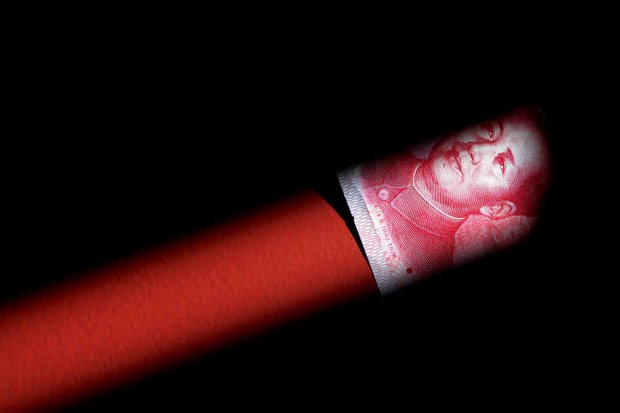
Last month, China's foreign exchange reserves just fell below the psychological threshold of $3 trillion. The event got people talking about yet another worldwide financial firestorm. For Thailand, things could get even rockier than in 2008 as the epicentre of the earthquake would be much closer to home this time around.
With the prospect of a slowing economy, money has been pouring out of China since mid-2014. During this period, the yuan depreciated by over 10% and recently touched an eight-year low. This would have been business as usual, had it not been for the staggering pace at which China lost its reserves, especially in late 2015. Since then, the speed has slowed somewhat, but the trend persists.
Generally, foreign exchange reserves are assets that governments hold onto to pay foreign debts and manage currencies when needed. Having sizeable reserves, therefore, projects financial stability and inspires confidence in a domestic currency. Without it, China could be in a weaker position during battles against financial imbalances like high corporate debt and the overheated property sector; all of which could lead to the much-feared scenario of China's crash-landing.

Sutapa Amornvivat, Ph.D. is Chief Economist and First Executive Vice President at Siam Commercial Bank. She has international work experience at IMF, ING Group and Booz, Allen, Hamilton. She received a BA from Harvard and a PhD from MIT. Email eic@scb.co.th. EIC Online.
To slow capital outflows, China has been putting up control measures to ensure stability. Yet, the size of recent China's cross-border flows was as large as 4% of its GDP. This level is basically on par with other countries with open capital accounts like Japan and Korea. Under this condition, China will need large reserves to keep the yuan at its desired level through buying and selling operations. By Bloomberg's calculation, the IMF's methodology suggests China needs a minimum reserves level of US$2.9 trillion to maintain its peg. This threshold too will be breached within a few months. Soon China will need to ramp up its capital controls, which will have consequences on anyone involved in the flow of money in and out of China.
How worried should Thailand be? In the face of tighter capital controls, some segments of the Thai economy stand to lose. The impact depends on the types of control measures and their targets.
China currently subjects all outward direct investment projects valued above US$1 billion, or roughly 35 billion baht, to case-by-case approval. Under close scrutiny are deals by Chinese companies made outside of their core businesses.
The current rule should have a limited impact on Chinese FDI in Thailand, given its relatively small project size (averaging 414 million baht, according to the Thailand Board of Investment). Even that for one of the larger projects by Sentury, a major tyre manufacturer from Shandong Province, recorded at 8 billion baht, is well below the threshold. Nonetheless, harsher enforcement of existing rules could cause delays in transactions. But, it should not interrupt the long-term trend of Chinese investment in Thailand.
On the other hand, the government has renewed the foreign exchange quota of $50,000 per person per year. Individuals must also provide proof of the purpose of currency conversion. The restricted amount should be large enough to cover expenses for approved areas such as tourism and education. However, overseas real estate markets that have been benefiting from a Chinese investment glut could feel the impact. Thailand, this is concentrated on condos of up to 5 million baht targeting Chinese buyers. A Financial Times survey suggests this segment accounts for most Chinese real-estate buyers in Thailand. There is also a high concentration of real-estate purchases in tourist spots like Bangkok, Pattaya, Chiang Mai and Phuket. In the grand scheme of things, however, this makes up a small portion of the Thai real-estate market and should have no significant macroeconomic impact.
Aside from beefing up its capital controls, China will have to do more to slow down its reserve depletion. Even with seemingly strong barriers, people often find ways to get around the restrictions. One alternative policy tool is to tighten monetary policies by raising interest rates. This will boost returns on domestic assets, effectively keeping more money within its borders. Earlier this month, China's central bank, the People's Bank of China (PBOC), signalled this tightening stance by raising rates on loans via the government's targeted lending facilities. Yet, the PBOC can only raise interest rates by so much because higher rates will add a burden to debt holders, hurting the already-fragile economy.
Another option more in line with China's long-term goal is to let market forces prevail and the yuan depreciate more sharply. This could be risky, if done in a disruptive manner. A sudden devaluation of the yuan has proven a bitter pill for the financial markets as we have seen in the past few years. In 2015, the PBOC took the surprise decision to devalue the daily yuan reference rate by nearly 2%. The move led to a sharp drop in Shanghai's stock market and created ripple effects on Asian currencies, the baht included, and stock markets elsewhere.
Unexpected moves by the PBOC could also derail China's long desire for yuan internationalisation. In fact, 2016 saw a small decline in the share of the yuan as international payments, according to the SWIFT international payment network.
A mix of various tools are the most likely choice for the Chinese government to halt capital outflows. However, there is always a risk of the capital situation spiraling out of control, in which case, China would have no choice but take a drastic action in desperation to maintain its economic stability. Against this tail-risk turn of events, the Thai export sectors, especially rubber, primary plastics, and LCDs, would suffer a serious blow as almost a third of Thai exports in these three categories go to China.
Things could take a turn for the worse given the current global economic environment. The unpredictable state of US policy towards China adds more complexity to the fragile situation. Even since taking office, President Trump has indeed been a "man of action", quickly delivering on his promises; among which is branding China a currency manipulator. It's difficult to guess what Mr Trump will do to China. Criticism of China for keeping its currency artificially low (though it is untrue) could be damaging enough and be the straw that breaks the camel's back -- or in this case, the dragon's.
When China sneezes, the whole of Asia likely catches a cold. Thailand won't escape the this fate either. For now, we should get ourselves vaccinated through long-term reforms like export restructuring, infrastructure upgrading, and an education system overhaul. Otherwise, once the calamity hits, we could be bed-ridden for a long time.
